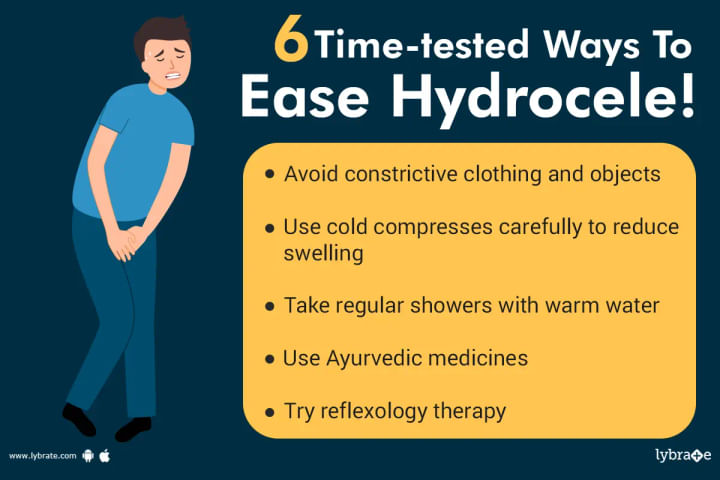Home Remedies That Ease Your Hydrocele
What are the signs and symptoms of Hydrocele ?
Signs and symptoms of a hydrocele include the presence of a large, painless lump in the scrotum. Other signs and symptoms can include:
- A dull ache that may occur intermittently
- Swelling which is localised and does not affect both sides
- Red or swollen scrotum
- A feeling of heaviness in the scrotum.
What are possible complications of Hydrocele ?
- Hydrocele can cause pain and aching in the scrotum, abdomen, and testicles.
- It can also lead to decreased fertility by blocking blood flow to the reproductive organs.
- If the hydrocele is large enough it can, over time, lead to compression of local nerve tissue resulting in permanent impairment or disfigurement.
- If left untreated or if inadequate treatment is provided there could be recurrent problems requiring surgical intervention at a later stage in order to provide complete resolution of symptoms and return of full function.
- In rare cases infection or other complications may occur as a result of hydroceles and require medical attention or even hospitalization parts of treatments like draining they fluid via aspiration surgeries or complete removal surgery or even greater surgeries may be required due to epididymitis which is an inflammatory issue caused due to unresolved hydrocele issues and thus is seen as one complication associated with it.
Ayurvedic and daily home remedies and tips to avoid Hydrocele
- Avoid constrictive clothing and objects. Tight pants, underwear and belts can place unwanted pressure on the testicles, making them feel uncomfortable and increasing the risk of developing hydrocele. If a hydrocele does develop, avoid wearing anything that constricts or squeezes around the scrotum.
- Use cold compresses carefully to reduce swelling. Place a cold pack over your scrotum for 15 minutes every few hours to help reduce swelling caused by fluid accumulation in a hydrocele. Do not overdo it or apply ice directly against the skin as this can result in frostbite or excessive tissue damage.
- Take showers instead of baths; shower regularly with warm, not hot, water to get rid of dead skin cells that may build up around the testicles due to fluid trapped in the testicles from a hydrocele condition.
- Use Ayurvedic medicines like castor oil for topical application on the area affected with Hydrocele .These external applications help cure Hydrocele by reducing pain, swells derangement effectively .Additionally drinking herbal tea prepared from Primrose root ,turmeric helps in reducing symptoms associated with Hydrocele
- Try reflexology therapy There have been many claims that therapeutic massage and reflexology can be used to treat hydrocele conditions as these treatments break up scar tissue and force circulation through areas where an accumulation of fluids has occurred as part of an ongoing cycle that can lead to recurring cases of hydrocele.
Here are some of the home remedies that may help relieve your hydrocele symptoms:
- Tight Underwear: Wearing snug fitting underwear can offer support and reduce the chances of further accumulation of fluid in the scrotum. It may also help relieve pain caused by hydrocele swelling.
- Ice Packs: Applying an ice pack directly to the affected area may provide relief from itching, burning, and pain associated with hydrocele. However, it should be done for twenty minutes at a time once or twice each day to avoid cold-related tissue damage.
- Garlic: Eating garlic daily may reduce the size of the hydrocele due to its anti-inflammatory properties which aid in draining the excess liquid from your scrotal sacs naturally over time. Additionally, it contains antioxidants which boosts immunity and helps fight infection that can cause hydroceles in some cases.
- Fenugreek Seeds: Drinking hot water with ground fenugreek seeds every day can help reduce fluid accumulation and improve overall healing as well as relieving anxiety related to this condition due to its antispasmodic properties that helps relax muscles around the swollen area.
- Herbal Compress: Applying a warm herbal compress helps stimulate blood flow and promotes lymphatic drainage while reducing inflammation associated with hydroceles naturally overtime when used regularly for twenty minutes at least thrice each week until improvement appears visibly
What are the surgical treatments for Hydrocele ?
Surgical treatment of a hydrocele is often recommended, as it’s the most effective option for immediate relief of the swollen testicle.
Hydrocelectomy
An outpatient procedure called hydrocelectomy can remove the excess fluid from around the testicle and correct any anatomical abnormalities associated with a hydrocele. An incision is made in the lower abdominal area to reach and drain out the fluid, as well as repair any tissue damage to prevent recurrence.
Microsurgical procedures
They are sometimes used for effectively repairing a hydrocele without an incision or leaving behind scarring post-surgery. It involves making several small puncture holes in the scrotum and then utilising scissors or biopsy forceps to drain out the accumulated fluid around the testicles and surgical tools for repairing damaged tissue structures causing obstruction in tubular flow, if any.
Laparoscopic Surgery
In some cases, laparoscopic surgery may be performed instead of standard hydrocelectomy when particularly large amounts of fluid have accumulated around each testicular sac.
Smaller cuts are made on either side of the patient's abdomen, through which cameras and specialised surgical instruments pass directly into the patient's scrotum area in order to assist in dipping out gross amounts of abnormal fluids without causing much damage or discomfort during post-surgery recovery period.
Overall, surgical treatments are typically quite successful at resolving symptoms – even those due to very large-volume collections with negligible risk factors involved; but they should only be carried out by experienced professionals who possess skills & expertise necessary for ensuring best possible outcome within short recovery time frame & reduced risk for developing chronic complications later on down line.
Best doctors to consult for Hydrocele
- An urologist is usually the best healthcare professional to consult for hydrocele.
- Urologists specialise in diseases and problems related to the urinary system, including hydroceles.
- Your primary care physician can also help identify if your symptoms are related to another medical condition, such as hernias or testicular torsion, and then refer you to the proper specialist.



+1.svg)
